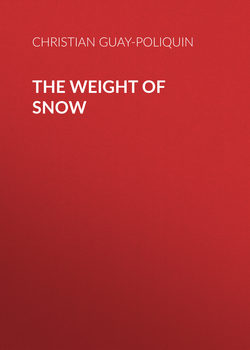Читать книгу The Weight of Snow - Christian Guay-Poliquin - Страница 20
На сайте Литреса книга снята с продажи.
FIFTY-SIX
ОглавлениеThe wind rose in the night. Squalls shook the porch. It has begun to snow. I hear it beating against the window like birds deceived by their reflections.
From this side of the dark glass, I observe my face. A large, dark stain of shadow, haggard eyes, greasy hair, unkempt beard. Under the covers, the flat outline of my prone body, thin, useless.
Matthias is in the rocking chair. He is repairing one of the straps on his snowshoes. The oil lamp shivers. Soot is slowly smearing the glass bell. The wick should be trimmed, but Matthias does not react, too absorbed by the task at hand.
We have finished eating. The dishes washed, the floor swept, the wood stacked. Everything as it should be. I don’t know how he does it. The hours run together, the days repeat, and Matthias gets busy. He never stops, except to read. From dawn to dusk, he toils, cleans, cooks. He works slowly, never hurried. The way the snow falls. And he is right. He has to do something. Winter roars, the blackout takes us further back in time, and losing touch is the most pressing danger.
Even if I won’t accept my fate, I have to accept that I am lucky to have ended up here. Maybe I will never walk again, I have lost all desire to speak, but I’m not dead. At least, not yet.
As he sews the leather strap, Matthias watches me from the corner of his eye.
You know, during the world wars, some conscripts refused to join the army, he begins. Some of them got married in a hurry, and others, like my father, went and hid in the woods and hoped they’d be forgotten. But taking to the forest wasn’t easy. The winters were harder back then. And bounty-hunters had all the patience they needed to watch the outskirts of the village for the slightest sign of life. A rifle shot, a plume of smoke, an unusual path in the snow. Military justice was generous when it came to denunciations or information that would let them locate and hunt down deserters. But most of the time, the villages supported them secretly. Provisions were left at strategic points. The poor guys came to get the stuff in the middle of the night, attracting no attention, and returned to the mountains to pursue their desperate survival. Even in the depth of winter, they lit a fire only once darkness had fallen, and when the nights were clear, it was wiser not to stir the embers from the previous day. Deep in their hiding places, the young men busied themselves the best they could as they stared at the forest moving in on them. They darned their clothes, played cards, and polished their hunting rifles. Sometimes tensions grew, and when they switched sentinel duty, they would cast wary glances at their fellows. Yet they knew they could not do without each other. If they wanted to survive, they would have to face the cold, hunger, and boredom together. They soon understood that the most important job was, without a doubt, to tell stories to each other.
The wind is still blowing. The squalls pummel Matthias’s story and make the walls of the porch groan.
Resisters and deserters, it comes down to the same thing, Matthias went on. All of them had to spend the winter in some shelter, hunkered down in the middle of nowhere, saving their energy as they waited for spring. Spring, with its liberation. With a guy like you, he tells me, it wouldn’t have worked. We would have been discovered or would have killed each other. No one can survive with someone who won’t talk.
